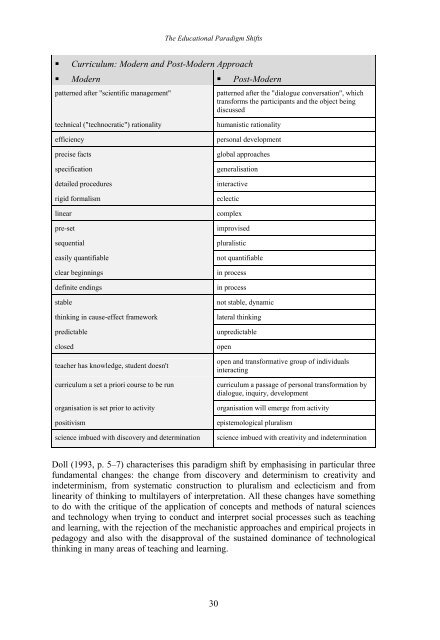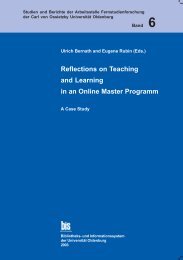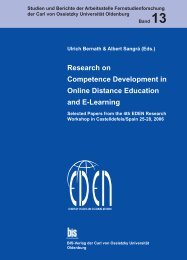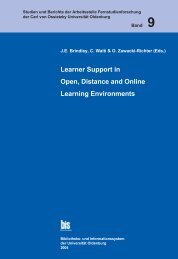- Page 1 and 2: Studien und Berichte der Arbeitsste
- Page 3 and 4: Studien und Berichte der Arbeitsste
- Page 5 and 6: Acknowledgements Chapter 1: “Grow
- Page 8 and 9: Series Editors' Foreword In 1994, D
- Page 10 and 11: Foreword by Fred Lockwood As an edu
- Page 12 and 13: Introduction Owing to the exponenti
- Page 14 and 15: 1 Growing Importance of Distance Ed
- Page 16 and 17: Growing Importance of Distance Educ
- Page 18 and 19: Growing Importance of Distance Educ
- Page 20 and 21: Growing Importance of Distance Educ
- Page 22 and 23: Growing Importance of Distance Educ
- Page 24: Growing Importance of Distance Educ
- Page 27 and 28: The Educational Paradigm Shifts Eve
- Page 29: The Educational Paradigm Shifts the
- Page 33 and 34: The Educational Paradigm Shifts eng
- Page 35 and 36: Perspectives The Educational Paradi
- Page 38 and 39: 3 Concepts and Models Introduction
- Page 40 and 41: Concepts and Models In distance edu
- Page 42 and 43: Concepts and Models students only b
- Page 44 and 45: Concepts and Models students attend
- Page 46: Concepts and Models teaching, becau
- Page 49 and 50: Online Learning: Visions, Hopes, Ex
- Page 51 and 52: Online Learning: Visions, Hopes, Ex
- Page 53 and 54: Online Learning: Visions, Hopes, Ex
- Page 55 and 56: Online Learning: Visions, Hopes, Ex
- Page 58 and 59: 5 Digitised Learning Environments:
- Page 60 and 61: Digitised Learning Environments: Ne
- Page 62 and 63: Digitised Learning Environments: Ne
- Page 64 and 65: Digitised Learning Environments: Ne
- Page 66 and 67: Digitised Learning Environments: Ne
- Page 68 and 69: Digitised Learning Environments: Ne
- Page 70 and 71: Digitised Learning Environments: Ne
- Page 72 and 73: 6 New Learning Spaces Introduction
- Page 74 and 75: New Learning Spaces characteristic
- Page 76 and 77: New Learning Spaces � There is a
- Page 78 and 79: New Learning Spaces Uncertainties T
- Page 80 and 81:
New Learning Spaces Opaqueness If t
- Page 82 and 83:
New Learning Spaces This interactio
- Page 84 and 85:
New Learning Spaces scenes from fai
- Page 86 and 87:
7 A Pedagogical Model for Using Vir
- Page 88 and 89:
A Pedagogical Model for Using Virtu
- Page 90 and 91:
A Pedagogical Model for Using Virtu
- Page 92 and 93:
A Pedagogical Model for Using Virtu
- Page 94 and 95:
A Pedagogical Model for Using Virtu
- Page 96 and 97:
A Pedagogical Model for Using Virtu
- Page 98 and 99:
A Pedagogical Model for Using Virtu
- Page 100 and 101:
A Pedagogical Model for Using Virtu
- Page 102 and 103:
A Pedagogical Model for Using Virtu
- Page 104 and 105:
A Pedagogical Model for Using Virtu
- Page 106:
A Pedagogical Model for Using Virtu
- Page 109 and 110:
Moderating a Virtual Seminar new le
- Page 111 and 112:
Moderating a Virtual Seminar other
- Page 113 and 114:
Moderating a Virtual Seminar Advant
- Page 115 and 116:
Moderating a Virtual Seminar Learni
- Page 117 and 118:
Moderating a Virtual Seminar formul
- Page 119 and 120:
Moderating a Virtual Seminar judged
- Page 121 and 122:
Moderating a Virtual Seminar We may
- Page 123 and 124:
Moderating a Virtual Seminar observ
- Page 125 and 126:
Moderating a Virtual Seminar the pr
- Page 127 and 128:
Moderating a Virtual Seminar 3. How
- Page 129 and 130:
Moderating a Virtual Seminar � I
- Page 131 and 132:
"Information" and "Knowledge" - On
- Page 133 and 134:
"Information" and "Knowledge" - On
- Page 135 and 136:
Knowledge "Information" and "Knowle
- Page 137 and 138:
"Information" and "Knowledge" - On
- Page 139 and 140:
"Information" and "Knowledge" - On
- Page 141 and 142:
"Information" and "Knowledge" - On
- Page 143 and 144:
"Information" and "Knowledge" - On
- Page 145 and 146:
"Information" and "Knowledge" - On
- Page 147 and 148:
"Information" and "Knowledge" - On
- Page 149 and 150:
"Information" and "Knowledge" - On
- Page 151 and 152:
"Information" and "Knowledge" - On
- Page 153 and 154:
"Information" and "Knowledge" - On
- Page 155 and 156:
"Information" and "Knowledge" - On
- Page 157 and 158:
"Information" and "Knowledge" - On
- Page 159 and 160:
Pedagogical Consequences of the Tra
- Page 161 and 162:
Pedagogical Consequences of the Tra
- Page 163 and 164:
Pedagogical Consequences of the Tra
- Page 165 and 166:
Pedagogical Consequences of the Tra
- Page 167 and 168:
Pedagogical Consequences of the Tra
- Page 169 and 170:
Pedagogical Consequences of the Tra
- Page 171 and 172:
Pedagogical Consequences of the Tra
- Page 173 and 174:
Pedagogical Consequences of the Tra
- Page 175 and 176:
Pedagogical Consequences of the Tra
- Page 178 and 179:
11 The Pedagogical Flexibility of t
- Page 180 and 181:
The Pedagogical Flexibility of the
- Page 182 and 183:
The Pedagogical Flexibility of the
- Page 184 and 185:
The Pedagogical Flexibility of the
- Page 186 and 187:
The Pedagogical Flexibility of the
- Page 188 and 189:
The Pedagogical Flexibility of the
- Page 190 and 191:
The Pedagogical Flexibility of the
- Page 192 and 193:
The Pedagogical Flexibility of the
- Page 194 and 195:
The Pedagogical Flexibility of the
- Page 196 and 197:
The Pedagogical Flexibility of the
- Page 198 and 199:
The Pedagogical Flexibility of the
- Page 200 and 201:
The Pedagogical Flexibility of the
- Page 202:
The Pedagogical Flexibility of the
- Page 205 and 206:
The Transformation of the Universit
- Page 207 and 208:
The Transformation of the Universit
- Page 209 and 210:
The Transformation of the Universit
- Page 211 and 212:
The Transformation of the Universit
- Page 213 and 214:
The Transformation of the Universit
- Page 215 and 216:
The Transformation of the Universit
- Page 217 and 218:
Visions of Autonomous Learning 1.3.
- Page 219 and 220:
Visions of Autonomous Learning Soci
- Page 221 and 222:
Visions of Autonomous Learning 4.3.
- Page 223 and 224:
Visions of Autonomous Learning abou
- Page 225 and 226:
Visions of Autonomous Learning expl
- Page 227 and 228:
Visions of Autonomous Learning Thes
- Page 229 and 230:
Visions of Autonomous Learning �
- Page 231 and 232:
Visions of Autonomous Learning �
- Page 233 and 234:
Visions of Autonomous Learning �
- Page 236 and 237:
References Aebli, H. (1983). Die Wi
- Page 238 and 239:
References Bell, D. (1975). Die nac
- Page 240 and 241:
References Dale, E. (1967). Histori
- Page 242 and 243:
References Faulstich, W. (1997). "J
- Page 244 and 245:
References Hauck, M. (2004). Explor
- Page 246 and 247:
References Jakupec, V. (1993). Das
- Page 248 and 249:
References Kuhlen, R. (1991). Hyper
- Page 250 and 251:
References Nolda, S. (2001). Vom Ve
- Page 252 and 253:
References Reinmann-Rothmeier, G. (
- Page 254 and 255:
References Schulmeister, R. (n. y.)
- Page 256:
References Weinberger, A., & Mandl,
- Page 259 and 260:
Giesecke, Michael: 136 Giovis, Chri
- Page 261 and 262:
Spada, Hans: 135, 136, 138 Spencer,
- Page 263 and 264:
computer-mediated: 32, 98; digital:
- Page 265 and 266:
emergence: 13, 17, 84, 86, 159, 162
- Page 267 and 268:
isolation: 47, 102, 103, 111, 119 I
- Page 269 and 270:
structuring: 79, 80-1, 86, 94; summ
- Page 271 and 272:
patchwork identity: 104 pattern rec
- Page 273 and 274:
self-regulated: 9, 29, 115, 126; se
- Page 275:
ASF Series Studien und Berichte der





